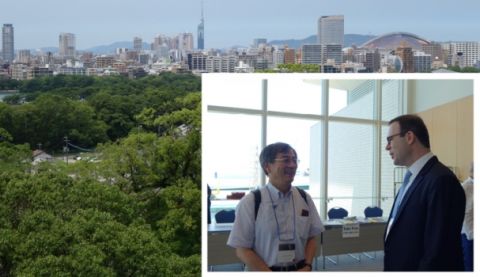
The summer of 2018 was a busy one for Professor Joshua Karton, Associate Dean of Graduate Studies and Research at Queen’s Law. In addition to working on his research, teaching at the Castle (Bader International Study Centre), and preparing for the upcoming academic year, he played three key roles in the world’s largest comparative law event.
Karton spent a week in Fukuoka, Japan, at the 20th Quadrennial Congress of the International Academy of Comparative Law. The weeklong event drew over 800 presenters and attendees from more than 50 countries, working in all areas of public and private law.
The opening ceremony was attended not only by legal academics, but also featured an inaugural address by the Chief Justice of Australia, Susan Kiefel, and welcome speeches from the Governor of Kyushu Prefecture, the Japanese Ministers of Science and Justice, and Prince Akishino, second in line to the Chrysanthemum Throne and a scholar of catfish aquaculture. “This fine display of dignitaries shows that, in most of the world, comparative law is taken much more seriously than it often is here in Canada,” says Karton.
In one of the most interesting aspects of the IACL Congress, reports are gathered from all over the world on a series of topics selected years in advance through a competitive application process. For each topic, a senior scholar serves as “general reporter” to synthesize the various national reports into a general comparative report that includes a discussion of best practices in the area and suggestions for legal reform.
Karton wrote the report for Canada on the topic of “Control of Price Terms in Consumer and Standard Form Contracts,” and also participated in a live discussion of the topic in Fukuoka. “Control of price terms is a seemingly obscure issue but actually has great relevance for everyday people’s lives,” he says. “It encompasses regulation of credit card interest rates, cell phone overage fees, electricity and gas costs, and a wide range of other contracts where there is significant potential for exploitation of consumers.” He found that while Canadian courts tend to be very reluctant to interfere with contracts to protect consumers when applying common law doctrines, they are quite assertive in interpreting statutes and regulations to achieve pro-consumer objectives.
Karton also participated in the first-ever Younger Scholars Forum at the IACL Congress. In that role, he presented a paper on corruption in international arbitration as part of a broader panel discussion on combatting corruption through public and private law.
Finally, as Chair of the Younger Comparativists Committee, a global organization of graduate students and junior academics working in every area of comparative law, he represented the youth movement in comparative law at various meetings and colloquia held during the congress. (Assistant Professor Alyssa King, a new faculty member at Queen’s, is also an active member of the Younger Comparativists Committee and serves on one its advisory groups.) At the annual meeting of the directors of the American Society of Comparative Law, which was held at the IACL Congress, Karton was elected to the editorial board of the American Journal of Comparative Law, the leading journal in the field. Starting in January 2019, he will serve as co-Book Review Editor of the AJCL.
It wasn’t all work and no play that week in Japan. “Luckily, I had time for a little sightseeing too, exploring Fukuoka and the nearby city of Nagasaki,” says Karton. “And of course, taking every opportunity to gorge myself on sushi, ramen, mochi, and other delicious local dishes.”